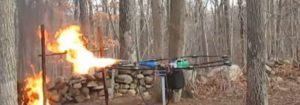 Connecticut may be the first state to ban so-called “weaponized” drones; but the plan also calls for an exemption for law enforcement. While it’s the exemption that civil rights advocates are most concerned with, the ban is also cause for concern in the drone industry.
Connecticut may be the first state to ban so-called “weaponized” drones; but the plan also calls for an exemption for law enforcement. While it’s the exemption that civil rights advocates are most concerned with, the ban is also cause for concern in the drone industry.
Lawmakers in the state first became concerned about weaponized drones after a CT teen posted a YouTube video of a drone outfitted with a flamethrower and a drone rigged with a gun. The teen and his father have been the subject of a lengthy court case after being investigated by the FAA to determine if any laws were broken. The case prompted CT to consider new drone regulations.
According to the National Conference of State Legislators, which keeps a database of current state drone laws, 5 states have weaponized drone bans: Nevada, North Carolina, Oregon, Vermont and Wisconsin. Maine and Virginia prohibit the use of “armed” drones by law enforcement. North Dakota allows law enforcement to use armed drones, but only equipped with non-lethal weapons like rubber bullets and tear gas.
While the NAACP and the ACLU have both spoken out against allowing law enforcement in CT to utilize weaponized drones – saying that it would create a dangerous precedent – there is less discussion about the prohibition of weaponized drones for the public.
Attaching a gun to a recreational drone seems like a bad idea – and it probably is. But a blanket ban that uses a word like “weaponized” and takes into account any equipment that could be construed as a weapon is simply too broad: and risks unintended consequences limiting commercial and recreational applications. Lawmakers considering the bill have probably not attended a maker-fair or STEM event that features drone battles, which are somewhat like the popular PBS show “Battle Bots”: enthusiasts build drones equipped with weapons to battle each other in a netted, safe arena. This kind of entertainment is a useful tool to get kids interested in robotics, and supports the hobby industry.
While most people might not be able to imagine a scenario for a flamethrower drone, there is one: in China, power companies use drones equipped with flamethrowers to burn trash off of the lines. The point is that broad and poorly defined prohibitions, no matter how reasonable they may seem now, risk causing problems for a rapidly evolving technology later. State legislators should think about what they are really trying to accomplish – preventing violence – and consider carefully whether or not a new law specifically aimed at drones is necessary.

Miriam McNabb is the Editor-in-Chief of DRONELIFE and CEO of JobForDrones, a professional drone services marketplace, and a fascinated observer of the emerging drone industry and the regulatory environment for drones. Miriam has penned over 3,000 articles focused on the commercial drone space and is an international speaker and recognized figure in the industry. Miriam has a degree from the University of Chicago and over 20 years of experience in high tech sales and marketing for new technologies.
For drone industry consulting or writing, Email Miriam.
TWITTER:@spaldingbarker
Subscribe to DroneLife here.







Good points, weaponized drones can be used for good things as much as bad. I think we just have to be responsible with them and have certain laws in place.